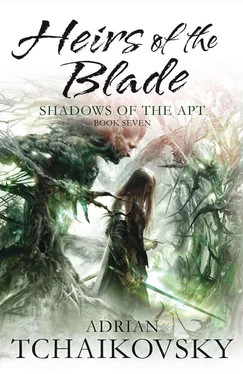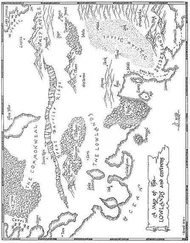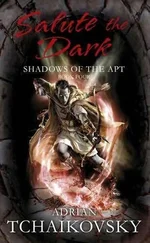Adrian Tchaikovsky - Heirs of the Blade
Здесь есть возможность читать онлайн «Adrian Tchaikovsky - Heirs of the Blade» весь текст электронной книги совершенно бесплатно (целиком полную версию без сокращений). В некоторых случаях можно слушать аудио, скачать через торрент в формате fb2 и присутствует краткое содержание. Жанр: Фэнтези, на английском языке. Описание произведения, (предисловие) а так же отзывы посетителей доступны на портале библиотеки ЛибКат.
- Название:Heirs of the Blade
- Автор:
- Жанр:
- Год:неизвестен
- ISBN:нет данных
- Рейтинг книги:4 / 5. Голосов: 1
-
Избранное:Добавить в избранное
- Отзывы:
-
Ваша оценка:
- 80
- 1
- 2
- 3
- 4
- 5
Heirs of the Blade: краткое содержание, описание и аннотация
Предлагаем к чтению аннотацию, описание, краткое содержание или предисловие (зависит от того, что написал сам автор книги «Heirs of the Blade»). Если вы не нашли необходимую информацию о книге — напишите в комментариях, мы постараемся отыскать её.
Heirs of the Blade — читать онлайн бесплатно полную книгу (весь текст) целиком
Ниже представлен текст книги, разбитый по страницам. Система сохранения места последней прочитанной страницы, позволяет с удобством читать онлайн бесплатно книгу «Heirs of the Blade», без необходимости каждый раз заново искать на чём Вы остановились. Поставьте закладку, и сможете в любой момент перейти на страницу, на которой закончили чтение.
Интервал:
Закладка:
There were Mercers and Mercers, Dal knew. If this little band turned out to be the Monarch’s own – those wandering hero-magistrates who kept the peace, helped the needy, defended the weak, and put people like Dal Arche in his place – then his plan was sunk even before it could get under way. The Monarch had such good intentions, Dal knew, and would be horrified to learn that a peasant woodsman was gnawing at the fabric of Commonweal society in such a way. The Monarch was far, far away, though. The Monarch also, in Dal’s firmly held belief, reserved righteous indignation for the unruly peasants of this world, and turned a blind eye to the evils of the great and the good unless they ventured into outright treason.
The Monarch dispatched Mercers across the Commonweal to do her will, but the Commonweal was vast, and they were few. So it was that each noble house maintained its own elite, and called them Mercers for all that the title had never been earned. Dal was betting a great deal that these riders were locally grown. They would still be well trained and equipped, with glittering armour of steel and chitin, with bows and swords and majestic steeds. They would also be equipped with a thousand years of tradition telling them how much better they were than the wretches who dared offend against the natural order of the world.
Dal shrugged his recurved bow off his shoulder, one hand selecting an arrow from his quiver.
The Commonweal had always had brigands, like a beast had ticks. They had included disaffected peasants, criminals, the estranged and the misfits. They had preyed on good and honest folk, and the princes had hunted them down and brought justice back to the land. Everyone knew that, of course.
There were fewer stories about those times when a noble had gone bad: second sons and daughters not content to be left without an inheritance, the cruel, the mad, the feuding – those who rallied evildoers about them and set themselves up as petty tyrants. It was considered bad luck to tell stories about such fallen princes, in case their virtuous kin should take offence.
Dal watched as the band of horsemen galloped closer to the burning village, while sparks drifted either side of him or landed, stinging, on his skin. The now-empty storehouse would catch fire soon enough, completing his day’s work.
It was always the case: a few of Dal’s people had not withdrawn soon enough, still chasing some last piece of loot, or just believing they knew better. One of them caught an arrow in the chest, the lead Mercer standing up in the saddle to loose it without his mount’s speed slackening at all. The rest scattered as the six riders thundered between the burning ruins of the houses, aiming directly for the barge.
In the past, brigands had been nothing but angry, maladjusted farmers, with perhaps the odd woodsman amongst them who could string a bow. Mercers, even the local kind, were a constant terror to them. Even now the stragglers among Dal’s people were fleeing in all directions, while the Mercers rode past them, turning in the saddle to aim and loose arrows at every target, and hitting them more often than not.
Dal took careful aim and loosed, too, but the rearmost rider shouted a warning even as he did so. The shaft struck the approaching woman’s shimmering breastplate and glanced off, knocking her sideways and half out of the saddle. A moment later, she had taken to the air, as did half the others.
Soul Je took careful aim and put a three-foot shaft through the Mercer woman, striking an inch over her breastplate’s collar and plucking her out of the sky. Dal’s shaft was supposed to have provided the signal, but it was her blood that prompted the brigands to counterattack.
Of those fleeing to the barge, perhaps a dozen had courage enough to turn around and face the horses, bending bows and setting spears. Amongst them was the Wasp, Mordrec, his hands flashing fire as the Mercers came on. On all sides, though, Dal’s people were suddenly springing from behind bushes, from the perilous shadows of burning buildings, from the waters of the canal itself. Arrows danced and sang through the air, mostly to no avail, but three separate shafts managed to strike the same man and throw him from his saddle. He was still alive as he hit the ground, his mail preserving him from the onslaught of the flimsy hunting bows most of the bandits carried. Then there were spearmen converging on him, three or four of them together, and within six or seven stabs they had found some part of him the armour did not cover.
The other Mercers were circling, two on horseback still and two in the air. Had they chosen to flee then, they would have got away with it. Dal could see their faces, though, and realized that they could not believe what was happening to them – that peasants were taking such liberties with their lives.
Dal Arche selected another arrow, then waited for a target to present itself. He saw one of the horses rear and fall as Mordrec’s sting lashed into it. The rider tried heading for the sky but one of Dal’s men struck him across the back with a cudgel, and another, a Grasshopper, leapt high in the air and grabbed hold of him, bringing the stunned man down to earth again. Another Mercer had gone down with a crossbow bolt in the leg, courtesy of Barad Ygor, and now Ygor’s pet scorpion was busy savaging the victim, claws prying apart mail and plates to get at the meat beneath.
Dal Arche sighted carefully, as calm as a man on a practice range, and sent a shaft through one of the fliers’ throat even as the Mercer was drawing back his own bowstring.
Their final opponent was ascending, up and up, still staring downwards in incredulous horror. Dal called up his own wings, but Soul was aiming, string pulled back beside his ear as he sighted almost into the sun. The arrow leapt from his bow, so fast as to seem invisible, and all Dal saw was the shuddering impact, and then the Mercer was tumbling from the heavens.
In the old days, bandits had been those unable or unwilling to live under the rule of princes, and perhaps that had not changed. What had changed, though, was the number of disgruntled peasants who had been ripped from their land and forced to fight in a war, who had seen their friends and comrades and families cast away in one doomed battle after another, as the Empire ground its way across the Commonweal map. They had died in their droves, those levies of the Commonweal, given spears but no training and scattered like chaff against the greatest armies of the world. Those who had survived, though…
Those that survived had learned soldiering the hard way. Men like Dal Arche himself, baked hard in the fires of war, tough men with sharp edges. They had lasted out the war itself and then found they could not go home, either because it was now beneath the Imperial flag, or because they had changed so much in character that nowhere in the Commonweal seemed like home to them.
They were the men who had learned what comes of following princes.
When the fighting was over, Dal flew down to confer with his lieutenants, as the rest of his men prepared the barge for its departure.
‘We won’t get it that easy again,’ Mordrec remarked.
‘When have we ever had it easy?’ Dal asked him. ‘I want you three to go back south and keep recruiting. We’ll need more men.’
‘The Salmae are going to be riled,’ noted the Wasp. ‘We’re sure we know what we’re doing?’
Dal looked from face to face. ‘The Salmae have already shown us that they won’t accept us as neighbours. They wrote that message clear enough. Now we’ve sent them our reply, in proper noble language.’
‘We’ve declared war,’ Mordrec translated.
‘That’s what I said,’ agreed Dal, seeing Soul Je, who seldom spoke, nodding in agreement.
Читать дальшеИнтервал:
Закладка:
Похожие книги на «Heirs of the Blade»
Представляем Вашему вниманию похожие книги на «Heirs of the Blade» списком для выбора. Мы отобрали схожую по названию и смыслу литературу в надежде предоставить читателям больше вариантов отыскать новые, интересные, ещё непрочитанные произведения.
Обсуждение, отзывы о книге «Heirs of the Blade» и просто собственные мнения читателей. Оставьте ваши комментарии, напишите, что Вы думаете о произведении, его смысле или главных героях. Укажите что конкретно понравилось, а что нет, и почему Вы так считаете.












